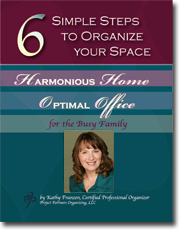In the “old days,” people used their cars simply to get from Point A to Point B. But today, vehicles are used for much more than transportation, so it’s no wonder they get messy. To get car clutter under control, starts by figuring out how you use your car. Do you drive your kids’ soccer carpool? Do you work out of your SUV? Do you run daily errands? Evaluate how you use your car, and it will be easy to make — and keep — it tidy.
• Get papers under control by creating an on-the-go filing system. Whether you office out of your car, or just need to have lots of information at your fingertips, create a simple filing system. Your local office supply store has a variety of portable, lidded file boxes to choose from, or use a simple plastic crate. Label hanging file folders with broad categories, and slide important papers in the correct spots.
• If you work from your car, create a portable office. In addition to a portable filing system, include essential office supplies, such as pens, sticky notes, paper, envelopes, and stamps in a neat box.
• Take note. Brilliant ideas have a way of sneaking up on us. Make sure you don’t forget them by stashing a small hard-cover notebook to catch those moments. Or, to keep your eyes on the road, tote a mini-recorder or call your voice mail and leave reminders there.
• Ward off the munchies. Keep healthy and easy-to-eat snacks easily accessible for yourself and hungry kids. Fill a small shoe box with granola bars, small bags of almonds or walnuts, dried fruit, juice boxes, and water.
• Run errands with ease. Put a crate in your trunk for clothing that needs to go the the tailor or dry cleaner. You can also add items that need to be returned to stores, library books and movies ready for return, and loaned items that need to find its rightful owners. Take a peek in the box each morning and see what you can get rid of that day.
• Consider some specialty car organizers. Discount stores offer a variety of them, such as back-of-the-seat organizers for kids, visor organizers for CDs, collapsible crates for groceries or sports equipment, and much more.
• Toss it out and tidy up. Keep a nylon or plastic garbage bag in the car so messes get cleaned up as you go. Take five minutes at the end of each day to empty the bag and tidy up the entire vehicle. This small investment of time will keep it neat and organized. To ensure it stays clean and crumb-free too, plan to vacuum and wipe down or dust the interior every week or two, or invest in occasional visits to your neighborhood car wash.
© 2006 Articles on Demand™
 FREE E-Book: 6 Simple Steps to Organize Your Space
FREE E-Book: 6 Simple Steps to Organize Your Space